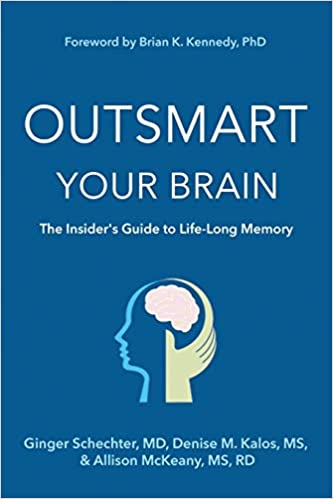
Cognitive decline is a major concern of the aging population. And not without reason: every 66 seconds, someone in the United States develops Alzheimer’s disease. Currently one in three seniors die with Alzheimer’s or another dementia. In the United States, it is estimated that this will cost up to $1.1 trillion by 2050. Something must be done before Alzheimer’s steals the memories and finances of a whole generation.
While researchers continue to look for a cure, it is becoming clear that there are effective treatment options. More and more research supports the conclusion that Alzheimer’s is not only about plaques and knots in the brain cells, but a complex and systemic disease.
According to the authors of Outsmart Your Brain: the Insider’s Guide to Life-Long Memory the best research has been consolidated to develop this easy-to-follow guide to life-long brain health. Authors Dr. Ginger Schechter, Allison McKeany, and Denise M. Kalos, explain how diet and nutrition, exercise, stress management, sleep, socializing, brain stimulation and behavioral changes and habits can have a positive impact on memory.
The book is published by Affirmativ Health, an organization which sought to determine whether a comprehensive and personalized program, designed to mitigate risk factors of Alzheimer’s disease, could improve cognitive and metabolic function in individuals experiencing cognitive decline. Findings provided evidence that this approach can improve risk factor scores and stabilize cognitive function. The study was published July 2020 in the Journal of Alzheimer’s Disease Reports. It uses a more comprehensive, personalized approach that addresses each participant’s unique risk factors. You can see it here.
Four years ago, Affirmativ Health was the first to bring the latest health-conscious science to those living with or at risk of Alzheimer’s disease and other dementias. By taking a personalized medicine approach, they address an individual’s unique, modifiable medical and lifestyle risk factors to improve cognition. ◊

Leave a Reply